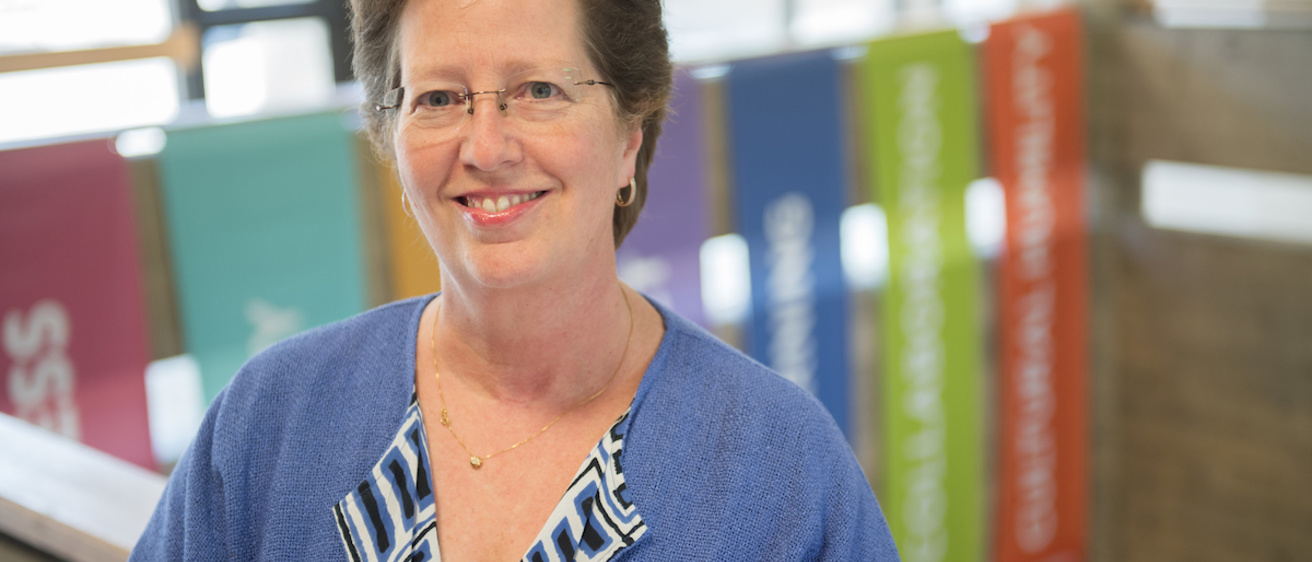Two weeks into her new job as dean of the University of Iowa College of Nursing, Julie Zerwic is already tackling priority projects, including the creation of new cross-campus relationships and the start of a highly anticipated $11.8 million renovation of the College of Nursing Building.
“This is an initiative that was underway before my arrival, so it’s fun to come in when it’s actually time to start moving forward,” says Zerwic, who took over leadership of the college on Aug. 14. Armed with previous experience managing a renovation project, Zerwic says she’s eager to tear down walls, revamp classrooms, and upgrade student areas.
“Physically, it’s going to be very different,” she says. “This renovation is incredibly important for the college.”
Zerwic comes to the UI from the University of Illinois at Chicago (UIC) where she served most recently as executive associate dean at that institution’s College of Nursing. She says she’s eager to build new and innovative cross-campus partnerships, including possible opportunities with medicine, dentistry, business, engineering, and the sciences.
“I’m looking to see where our research intersects with research in other disciplines,” says Zerwic. “I think it’s vital to collaborate in research—but also in educating our students. I’m looking for ways to create new nursing minors, new electives, and new practice opportunities.”
Zerwic, who is originally from Green Bay, Wisconsin, is the College of Nursing’s eighth dean. She succeeds Rita Frantz, who served as dean from July 2007 until retiring for health reasons in September 2016.
During a long career at UIC, Zerwic held several positions. In her role as nursing executive associate dean, she improved faculty, staff, and student diversity and boosted alumni fundraising. She also started a joint program between UIC and City Colleges of Chicago to provide minority community college students with university-level research opportunities.
What are some of the challenges you face as you take on this new position?
In the nursing profession, one of the biggest challenges is an aging workforce. We need another generation of nurses to take on the work of the current generation, many of whom are preparing for retirement. At the College of Nursing, we need to be thinking about how best to prepare the people who will be stepping into these roles in the future, especially the roles of nursing administrative leaders. The concern today is that there might not be enough nursing graduates to fill these vacancies. We need to be asking ourselves, “Do we have the programs necessary to train the next generation?” and “Are we adequately supporting these programs?” Also, we need to ensure that we are bringing in students who want to pursue these jobs. In some ways, I think we need to change the lens through which students view their future. Often, students make career decisions based on what’s hot today, but we need to encourage them to look farther down the line.
We’ve talked about some of your top priorities as dean. Are there others?
Yes—improving workforce diversity is also important to me, but I’m not just talking about ethnicity and race. We need to be thinking about patient populations now and in the future. Do we have a workforce that has the skills and the experience to work with these populations? Rural health is a good example. We know we have a lack of skilled health care workers in rural communities. How do we fix that? What about patients with different religious beliefs? What about those in the LGBTQ community? A graduate student of mine reviewed two nursing textbooks and could find only a dozen or so pages in each book that talked about sexual minorities. If we aren’t including this type of information in our nursing textbooks, how will students educate themselves? What other resources do we need to provide to students to help them treat people from diverse backgrounds? If we are not giving students these resources, we are not fully preparing them to succeed.
What strengths do you bring to the dean’s office?
My career portfolio is very well-rounded. I have served in administrative roles, I have done research, I have taught, and I have looked at how to provide health care to people who are traditionally underserved. I have a broad spectrum of skills and interests, and I think that is why the search committee selected me. Going forward, I see myself working on both internal and external projects. Connecting with all of our constituencies—students, prospective students, nursing professionals, alumni, and friends of the college—is important to me. I see this as an opportunity to engage with constituents, to invite them to the table, to hear their stories, and to learn from their experiences.
